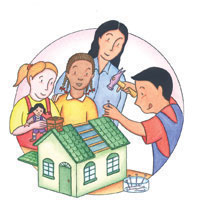
The Truth About School Visits: Avoiding Bad Days
By Alexis O'Neill
Bad days. We all have them. But when the bad day is
cau sed by a school visit,
how you deal with it makes the difference between your hosts viewing you
as a diva or a darling.
sed by a school visit,
how you deal with it makes the difference between your hosts viewing you
as a diva or a darling.
What's a "Bad Day"?
According to seasoned presenters, a bad day is primarily caused by a
school's lack of preparation for your visit, including:
- Teachers and students are unfamiliar with you or your books
- Lack of proper equipment and set-up
- Impossible schedule
- None of your books are available for sale
Heading a Bad Day Off at the Pass
- As soon as you schedule a visit, record names and email addresses of key people at the school (for example, the PTA program chairperson, librarian, principal, assistant principal, reading coach). Send an email to all of them before your visit. Tell them you're excited about coming.
- Send an Author Visit Packet to your host including materials that can be posted on the bulletin board or duplicated for the staff (click here and scroll to the bottom to find three samples of what I include). Include a list of equipment, and, if it's important to you, a diagram of how the room should be set up.
- Send one or two of your books as a gift to the library. Request that they be circulated to teachers before your visit.
- Ask your host about how the school plans to handle book sales. Include a sample book order form in your Author Visit Packet so the host doesn't have to design one. If the school declines to sell books (or refused to let you sell books yourself), have the book order forms ready to hand to teachers in case they wish to order an autographed copy from you or a local bookseller.
- Maintain email communication with your host from the time you are booked until the day before your school appearance. Re-check arrangements for your schedule, books and equipment.
Have a Backup Plan
You won't know until you
arrive if the school is unprepared. So, have at least two versions of
your assembly ready: Assembly A is geared to kids who have read your
books; Assembly B is geared to kids who don't have a clue who you are
or what your books are about. If you're a novelist, be prepared to give
a synopsis of your book and read a page or two from it. If you write
picture books, be prepared to read the story, or a good portion of it,
and show illustrations of the pages. Give the audience a flavor of your
style—as a person and as a writer or illustrator.
Attitude
When kids are prepared for your visit,
the impact is huge. But don't sulk if, in spite of all your efforts,
they are not prepared. It's not the kids fault. And you are getting
paid to do your program regardless. When things don't go as planned, be
a darling, not a diva. Schools will likely remember your attitude when
it comes time to recommend you to other schools. Most of all, you have
the power to impact students' lives whether they are prepared for your
visit or not!
Alexis O'Neill is the author of Estela's Swap, published by LEE & LOW BOOKS. Reprinted with permission from the author. This article originally appeared in the March/April 2007 issue of the SCBWI Bulletin (scbwi.org). Readers can contact Alexis O'Neill by emailing her here.
Contact Us
Telephone: (212) 779-4400 x 28
Email: quotes[at]leeandlow[dot]com
Educator's Newsletter: Subscribe
FREE Teacher's Guides
Helpful educator resources can be found at our Educators






